Occasionally clunky-to-the-point-of-groaners script and Scarlett Johanssen’s “acting” (as opposed to her stunt double, the wonderfully named “Heidi Moneymaker,” who is amazing) fail to ruin an overall enjoyable comic-book movie experience.
7
May
Oh, dear. They’re at it again, aren’t they?
Sorry, that probably requires a bit of explanation. Um, and I’m going to deliver that explanation in a nice, long paragraph, so that those of you who don’t want spoilers for the new Doctor Who episode, “Flesh and Stone”, which has aired in Britain but not in America, can skip this entry if you like.
Basically, for those of you not familiar with the series (or at least, not over-familiar with the series) the Doctor, an enigmatic wanderer in time and space, tends to have a traveling companion with him on his journeys. (Primarily as a way of solving a lot of writing problems–the Doctor tends to already know a lot of things the audience needs to know, so having an inexperienced traveling companion is an easy way of delivering expository dialogue that doesn’t sound forced.) These companions tend, very frequently, to be pretty young women. (Again, this is done for rather mundane reasons; the series wants to appeal to a very broad audience, and there are certain elements of the viewing public that respond strongly to pretty young women…for one reason or another.) Thus, it’s become something of a running gag among viewers that we never actually do see what the Doctor does in the TARDIS with those pretty young women between adventures.
And in the relaunched series (we are now trending towards the spoilery bits, here) that element has become more explicit. Rose, the Doctor’s companion, has a very obvious crush on the Doctor, and while the Doctor can’t ever bring himself to actually say the words, “I love you,” at any point, David Tennant is clearly playing the part as a man in love. Martha, the next companion, has her own crush on the Doctor, but since he’s still mooning over the departed Rose, she’s got no chance (an element that’s rather overplayed in Season Three, but that’s another story.) The romance angle goes into full retreat for Season Four and the 2009 specials (excepting for the season finale to Season Four, where Rose comes back and we practically get swooping strings when the two of them see each other)…but now it’s rearing its head again. Current companion Amy Pond just about jumps the Doctor’s bones at the end of “Flesh and Stone”. But the Doctor doesn’t reciprocate…despite Karen Gillan being just about the prettiest of the pretty young women ever to join the Doctor in his travels. Why?
The question is actually pretty contentious, in Doctor Who circles. (It says something about Doctor Who that it is actually less contentious than the question of what year the Third Doctor stories took place in.) There are a lot of people who believe that sex is off-limits in Doctor Who, at least in regards to the Doctor himself. They feel the Doctor should be above that sort of thing, even if they can’t necessarily articulate why. (Or if they can’t agree on a reason why. Doctor Who has possibly the strongest gay fan following of any science-fiction series, precisely because he’s a male sci-fi hero who doesn’t lust after women. To a lot of fans, the reason he doesn’t hit on his female companions is the same reason Will doesn’t hit on Grace.)
There are a lot of people who make the counter-argument that the Doctor most certainly does have a sexual relationship with many, if not most of his companions over the years. They insist that the people who insist “sex shouldn’t be allowed in Doctor Who” are prudes at best, Puritans at worst, who never noticed the sexual subtext of the older stories and now get angry when they spot it in the newer ones. (A sub-set of these people feel that there’s a sexual subtext to some, but not all stories, and that the Doctor has a “true love”, who is {INSERT COMPANION HERE} and that this is the perfect pairing and the series hasn’t been any good since that true love left and he’s been forced to make do with pale substitutes. All of these people are twelve-year-old girls. Even the ones who aren’t.)
Me? I fall at least a little into the former camp. I feel that there’s a reason why Russell T Davies and Stephen Moffat, the people who’ve been in charge of the relaunched series, haven’t pushed the boundaries of the Doctor’s sexuality too far. (And they really, really haven’t. For all that the Tenth Doctor is much more lovey-dovey than his predecessor, he still won’t even say the words, “I love you.” Not even once. My standing joke is that all the times he says, “Rose…I need to tell you…” and trails off, he’s trying to find a way to explain that traveling in the TARDIS makes you sterile.) It really isn’t in the Doctor’s character to have a sexual relationship with his companions, and Amy Pond provides the key to why. (Well, half the key.)
When Amy makes her rather blatant come-on to the Doctor, his response (played magnificently by Matt Smith) is absolute horror. He can’t imagine sleeping with Amelia Pond, because Amelia Pond is the seven-year-old girl he was just talking to a few days ago. Sure, she had a rather inconvenient case of growing up, but as the Doctor said to her, “Don’t worry; we’ll soon sort that out.” He’s not looking for a lover. He’s looking for a daughter. Or, if we’re to provide the other half of the key to the Doctor’s character, a grand-daughter.
Because the first pretty young woman the Doctor traveled with, back when he was an old man played by William Hartnell, was his grand-daughter Susan. (Also more contentious than sex: Whether William Hartnell was the actual first incarnation of the Doctor, or just the first we’ve seen.) The two were inseparable, each one the only reminder the other had of their home, and the original stories tended to focus on the differences between them and the humans that shared the TARDIS with the Doctor. (When Carole Ann Ford, the actress who played Susan, left the series, some speculated it wouldn’t survive her departure.) Susan’s departure was a watershed moment, a coming of age as the Doctor finally realized that staying with him was preventing her from living her own life. He forced her to stay behind with the man she’d come to love in one of the most bittersweet moments of the show’s history.
And the subsequent episode makes explicit what all the subsequent stories would leave as subtext. Ian and Barbara, the Doctor’s human friends, convince him to adopt a young orphan woman they’ve rescued from a crashed starship as their new traveling companion. Vicki becomes a surrogate grand-daughter to the Doctor, someone who makes him feel young and alive as they share the wonders of exploring the universe together…until she also falls in love with a boy and leaves. And the Doctor found another surrogate for Susan, and another, and another…at heart, Doctor Who is a series about a lonely old man who’s lost his family, and who finds it again with an orphaned girl. (This is the one really big mistake the new series makes with Rose, I think; not that she loves the Doctor, but that she only travels with the Doctor by choice. All the best companions of the old series were running away from something.)
Not every companion is living in Susan’s shadow, of course; Romana, for instance, seems to be pretty blatantly shagging the Doctor off-screen. (Mainly because Lalla Ward and Tom Baker pretty much were blatantly shagging each other off-screen. But now is not the time to delve into the vast store of gossip about who was having sex with who on the set.) But that’s the model of Doctor Who. That’s the reason why all the jokes about “What is the Doctor doing with those pretty young girls between adventures?” miss the point. The Doctor has a father’s love for his companions, not a romantic passion. There is most definitely a difference.
6
May
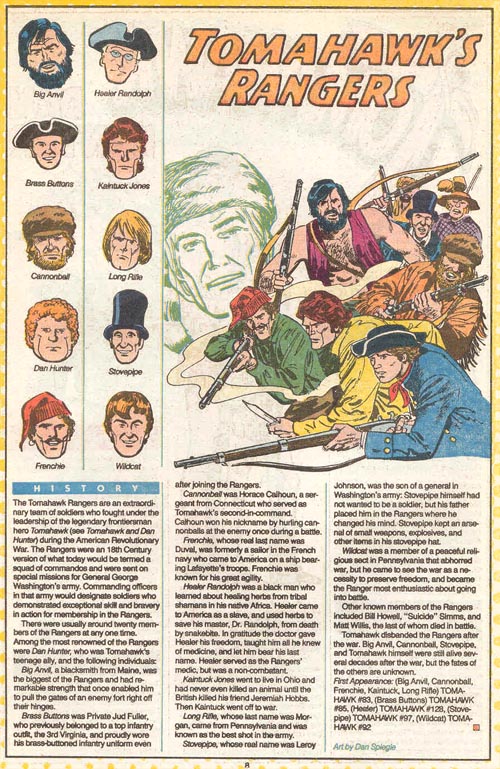
Meet Tomahawk’s Rangers!
Dan Hunter: Tomahawk’s sidekick and former man-boy life partner (seriously, one day I’ll post the Tomahawk and Dan Hunter entry from Who’s Who and you will al go eeeewwwwwwww) found himself dumped after he got old and chunky (look at the jowls on him, no wonder Tomahawk lost interest), so he found himself leading an elite unit of… guys!
Big Anvil: He’s strong! He once lifted a gate off its hinges! He’s got a beard! He wears a purple vest! Did we mention he’s strong? Because he’s strong!
Brass Buttons: This is a guy who came from a uniformed regiment and was so proud of the fact that he refused to take off his uniform even when he was in a band of guerrilla warriors. You can’t really ask questions about a guy who was in a top infantry regiment and then somehow got transferred to Tomahawk’s Band Of Unwashed Crazies; it wouldn’t be polite. Besides, the way he shined those buttons all the time was kind of creepy. Did anybody actually see this guy come from the regiment? Or did he just show up one day? Man, somebody ought to check that uniform for bloodstains or knife-stabbin’ holes.
Cannonball: Not the X-Man, but a guy who threw cannonballs at the enemy. Presumably there was no cannon working at the time. Or maybe there was. I mean, you can just see this guy throwing cannonballs, and there’s this other guy standing right next to him with the thingy that stuffs the cannon that looks like a giant Q-tip saying, “Uh, Horace, we’re just supposed to put the cannonballs in the cannon. That’s what they taught us in cannon school. I mean, look, the enemy’s still over two hundred feet away. Maybe we should fire the cannonballs with the cannon.” But Horace is all YARRRRRRRRGH TAKE THAT YOU BRITISH FUCKS and shortly thereafter he finds himself in Tomahawk’s Rangers.
Frenchie: A Frenchman! Who dresses like a Quebecois lumberjack! That makes him twice as French as anybody else on the planet! He grew up in a tiny French town and decided that it was just not French enough! Also, he is known for being agile – because he trained as a mime before learning to use his mimery to kill in the most singularly French way possible!
Healer Randolph: The amazing black man who is not actually black! Seriously, look at that dude. It must have been confusing when he was on the plantation. He’d be all “Can I help you, Master Johnstone?” And the visiting plantation owner from upstate would be all “WhaaaaAAAAAAA?” And then there would be a sitcom moment as everybody laughed and waited for his catchphrase, “No, actually I’m a slave, sir.” (Also, note that Healer Randolph was the only non-combatant in the Rangers. Typical that they didn’t want the black man having a gun. Didn’t they see The Patriot?)
Kaintuck Jones: Lived in northern Ohio all his life and still insisted on being called “Kaintuck.” His other nickname was “Dumbass Jones.”
Long Rifle: Actually just an excuse for the writers to come up with a strings of penis jokes.
Stovepipe: Kept explosives in his stovepipe hat. No, really. He did this. He decided that the best place to carry explosives was right on top of his head. And here’s the thing: Stovepipe survived the war! Lots of other Rangers all bought it (although, apparently, not “Suicide” Simms, who was particularly ill-named unless it was one of those things where you call the big fat guy “Tiny” or “Slim” because that’s funny) but Stovepipe, who spent just about every moment of every day courting death in the stupidest way possible, made it through unscathed. Fate is indeed a fickle bitch.
Wildcat: Was a Quaker and a pacifist until he went to war and found out that shooting people to death and stabbing them with bayonets and knives and occasionally spears or just, like, hitting them until they stop moving, and then staring at the red, red blood all over your hands – that is seriously like the most awesome thing ever! Occasionally wrote letters home that said things like Dear Mother and Father: Today I garrotted a Welsh-man who spied upon our camp. I believe I saw God in that moment.

5
May
A bunch of people – no, really, an honest-to-god bunch – emailed me asking for parodies of The Rise of Arsenal, which isn’t going to happen. This isn’t because the comic isn’t shitty1 but because it, like just about everything else people ask me to parody these days, is singularly joyless and unpleasant. I mean, you can say a lot of things about Civil War, but whatever else, it has fights and explosions and Big Moments and an actual good idea in there somewhere, so it at least starts out from the right place and then unspools in a crazy-ass rollercoaster ride into Whafuckville. Even when you are saying things like “wait, Tony Stark is going to hire Bullseye and Venom? Seriously?” it’s still at least fun to read.
The Rise of Arsenal has none of that; it barely has a plot, really. Instead, it’s three bad ideas rolled into one. It’s one-third Roy Harper angsting about his dead daughter, one-third Roy Harper telling off everybody else in the DC Universe for being irresponsible and unfit at their jobs and/or as parents, and one-third Roy Harper doing drugs and for some reason hallucinating about his now-dead pusher. Quick: which of those three things do you want to read about?
The correct answer is “none of them.” The second correct answer is “wait, are you seriously asking me if I want to read about Roy Harper?” Because, come on. This isn’t Batman we’re talking about here: this is a character who’s been in about half-a-dozen titles over the last fifteen years, none of which exactly set the comics world on fire. (Three of them were the inevitable “hey guys remember the Wolfman/Perez run on New Teen Titans” series that DC feels compelled to publish every four years or so for the six remaining people who really, really give a shit about Beast Boy.)
But on top of this being about Roy Harper, whom you don’t care about much when you think about it for more than two seconds, it’s a terrible series because it seems to be designed to remind everybody that superheroes, as a concept, are really quite stupid. We all know that superheroes are a stupid concept and they don’t work if you think about them for two seconds.2 When Roy screams out that the entire idea of kid sidekicks just endangers kids or that Donna Troy abandoned her kids to go “whore around in space with Kyle Rayner”3 all it does is remind me that I am reading a comical book about people in tights fighting crime and how none of that actually makes sense. It’s like if I was reading Lord of the Rings and Sam suddenly started whining about why hobbits shouldn’t have hair on the tops of their feet. It makes the entire comic feel like a judgement on the reader for enjoying the genre, for crissake, and it’s something DC in particular just keeps doing again and again and again, and when it’s not this particular thing, it’s something else about how I don’t like comics in the right way and every time it happens I want to read DC comics less and less.
Marvel doesn’t do this. They singularly don’t do this. When Marvel decided that they needed to “fix” Spider-Man by retconning out his marriage by having him make a deal with the devil, it was a bad idea concocted to justify a worse idea that only existed because people can’t stop fanboy-jerking off to the idea of Spider-Man as their inner teen selves and etc. etc. etc. But you know what? If I pick up a Spider-Man comic, I barely ever have to read a thinly veiled diatribe from some writer about how I’m wrong for not liking Spider-Man the way that they like Spider-Man. I just get a Spider-Man story. “Here,” Marvel says to me, “here’s the Spider-Man story we’re going to write. It might not be quite your thing, we hope it is, but if not… I dunno, I guess DC just resurrected Barry Allen, do you like that? Then read that. We’re gonna write Spider-Man the way we think he should be written, and that’s all we have to say about it.” It’s really a refreshingly adult way of handling things.4 Marvel can also generally avoid the “but how does the real world come into this” trap because their heroes tend to be more real-worldy in the first place, and when they aren’t, they basically just say “aw, hell with it” and have Thanos eat a planet or something.
And before someone goes to the fanboy partisanship well, understand that I came into comics as a DC fanboy – other than Spider-Man and the odd issue of Avengers – I barely ever even read Marvel comics growing up. I have no deep nostalgic connection to the classic 80s runs on Thor or Wolverine or Daredevil or Iron Man, I lack the emotional connection to the X-Men that half of the comic-reading population has (I don’t even have an opinion about Kitty Pryde!), and I only discovered Dr. Strange (one of my all-time favorite comics, naturally) as an adult. My first comics that I collected were Legion of Super-Heroes and Batman and Justice League of America and All-Star Squadron: you cut me and I probably bleed the old-school DC Comics logo, the DC in the blue and white checkered circle.5 Do you have any idea how much it annoys me that I officially now hate Hawkman?6 When I was a kid I actually kind of liked Hawkman! Now he sucks because he’s in shitty comics all the goddamn time! It makes me actively not want to read DC’s fresh output, in the fear that I might start hating Guy Gardner or Steel or someone else who still manages to be awesome.
That’s what The Rise of Arsenal does: it doesn’t promote Roy Harper as a character. It makes you hate his ass so much you wish that, as a character, he had died as a result of all that heroin he did. Retroactively, like.7 It torches any hope anybody ever had of liking this whiny loser, and yes I’m calling someone who just lost his daughter “whiny” because if this happened to somebody you know in real life and they went around calling you and all your friends “bad parents” because you’re a working parent or doing a dangerous job or whatever you would slap them across their fucking face, dead kid or no dead kid. I don’t care how many issues are left, because on the Hank Pym Scale of Forever-Unlikability Roy Harper is now at, oh, 8.2 Pyms and rising, and when he inevitably deals with all his issues in a fakey-fake happy-time way by the final issue of this godawful miniseries, probably ending in a scene where he runs triumphantly toward the reader with a big positive smile on his face and it says “never the end!” in a caption at the bottom of the page, it’s not going to make me dislike him less.
- Oh my god it’s SO SHITTY YOU GUYS [↩]
- I mean, we all read those miniseries Warren Ellis wrote for Avatar, right? Right? Of course we did. [↩]
- Which, I have to admit, is kind of awesome coming from the guy who fucked a psychotic professional assassin. [↩]
- Okay, so occasionally Dan Slott writes an “explanation” issue where he comes off slightly defensive, but in fairness, continuity geeks eat that up and sometimes you have to pander to them. [↩]
- That is poetic license. If you cut me, I will actually just bleed real blood. Also I will probably cry. [↩]
- And I do! Fuck Hawkman. And Green Arrow too. [↩]
- Maybe Green Arrow could make a deal with the devil so that could happen. [↩]
4
May
We use a team of sociology experts to determine snuggli-wuggliness
Posted by MGK Published in Bad Comedy, Photoshopp'd, TV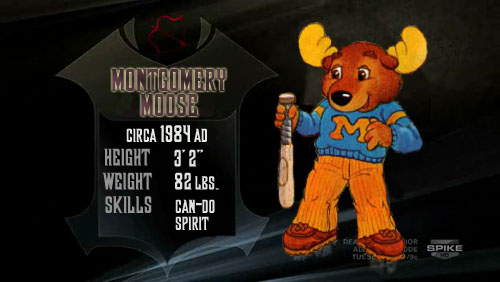
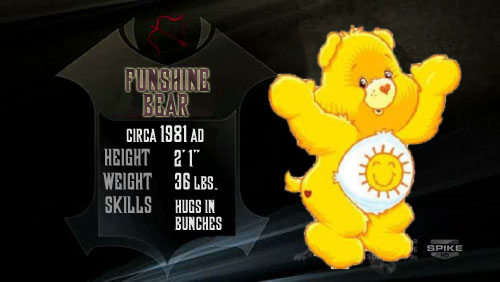
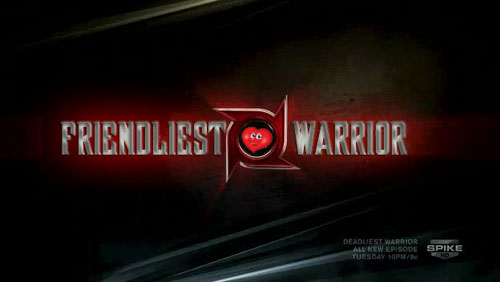
3
May
My weekly TV column is up at Torontoist.
3
May
Sneak preview of something I’ve been working on that’s about sixty percent finished:

Soon. Not as soon as you might like, but sooner than you think.
1
May
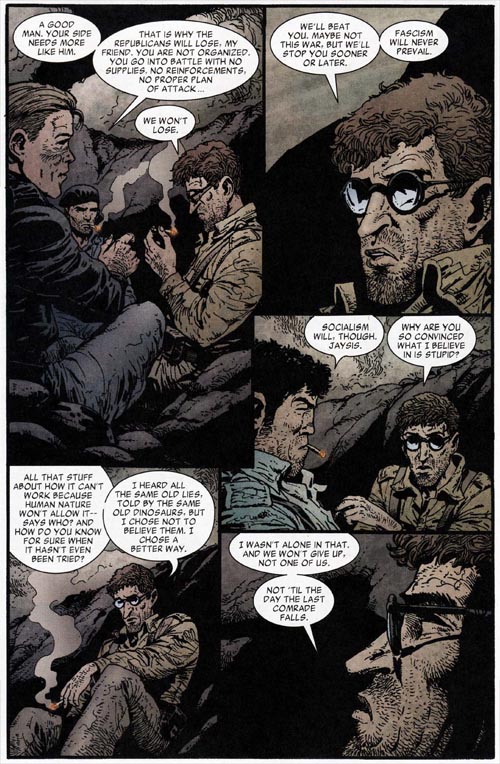
(from War Stories: Condors by Garth Ennis and Carlos Ezquerra)
30
Apr
Things I’d Like To Write Someday, #247654932
Posted by John Seavey Published in Comics, History, WriteringEver notice how sometimes, there’s a weird synchronicity at work in the things you read? I just got done reading a book about the Hollywood blacklist, and I’m now reading The Amazing Adventures of Kavalier and Clay (not bad, but I’d still rather read a biography than a roman à clef). Both of them focused a lot on the social unrest of the 1930s, as the world headed for war, and on a society that was far less united in its opposition to Hitler and fascism than we like to mythologize. (America has a disturbing tendency to mythologize its own past, and then unfavorably compare it to the realities of the present.)
Reading the two books together have sparked an idea in my head for a comic book. And since I’m probably never going to get a chance to write it, I’ll share the idea here.
It’s the biography of Steve Rogers.
When you think about it, we really don’t know much about Steve Rogers before he became Captain America. We know he walked into a recruiting office eager to do something–anything–to help fight the Nazis. We also know that his parents were dead by then (one of the reasons he was accepted as a volunteer was that he had no family.) But beyond that, it feels almost like he wasn’t a real person until the day they gave him the Super-Soldier Serum.
But I think he must have been a very interesting person indeed. Because Steve Rogers has always been socially progressive–his attitude towards Sam Wilson might seem patronizing to modern audiences, but for someone born in 1917, Steve Rogers is pretty damned enlightened. He seems to have been working-class; there’s no real mention of an inheritance anywhere in his background, and he’s had to take jobs to make ends meet on several occasions. And he’s very strongly anti-Fascist; it’s telling that he signed up to fight against Hitler a year before the United States’ entry into the war…and was passionate enough about it that he wouldn’t take 4F for an answer.
All those things add up to a very interesting, potentially shocking, probably fascinating backstory that’s never been touched on. Namely, that Steve Rogers probably grew up in a Communist household. He might not have been a card-carrying Communist himself, but his parents almost certainly were. Because being a Communist had a different meaning during the Great Depression than it did twenty years onwards, in a Cold War America. During the 1930s, when unemployment was high and a privileged few were almost completely insulated from the Depression’s effects, lots of people joined the Communists because they believed in things like unionization, racial equality, and fighting back against the rise of totalitarian dictatorships in Europe. (Lots of prominent leftists went to help in Spain against Franco before Hitler rose to power. It was the cause celebré of its day.) The later political connotations didn’t come about until after World War II…which is part of why so many people wound up getting nailed by accusations of associating with Communists when the witch-hunts started.
Both of Steve’s parents were Irish immigrants; I see Steve Rogers’ dad as a union organizer, perhaps a dockworker or a teamster. His mother might have been a seamstress, also a highly politically charged profession (when Steve Rogers would have been born, the tragedy of the Triangle Shirtwaist Factory fire was still a pretty recent memory.) The two of them probably believed solidly in the rights of the working man and woman, joined the Communist Party because many of their friends and fellow activists were members, and probably didn’t know nearly as much about Stalin as they thought they did. They might have led a fairly bohemian social life, rubbing shoulders with upper-class leftists like Hemingway or Dorothy Parker who liked to get involved with the lives of the people they were fighting for.
And by the time Steve was twenty, they were both dead. Certainly, that’s something that shouldn’t be treated lightly in any story about his life; union organizing in the ’20s and ’30s was a dangerous business. Activists could get beaten, jailed, or even discreetly murdered by hired thugs kept on the payroll. Maybe Steve’s dad died in a riot at the docks caused by paid agitators? Maybe his mother worked herself to exhaustion, eventually dying of pneumonia from trying to support the family single-handedly because Steve was too frail to get a job like his father had?
Steve’s poor physical health speaks volumes, too. It suggests malnutrition, childhood illnesses, the sort of thing that happened a lot in families too poor to afford good food and real doctors. Maybe Steve had a brother or a sister once, someone he never talks about because it’s too painful. Maybe he narrowly avoided the same fate.
The more I think about this, the more I think it would make a great story, a vibrant chronicle of pre-WWII America as seen through the eyes of a young man who would someday become its emblem. (Although he probably wouldn’t have stayed that way if he’d been around in the 50s. The HUAC would have had a field day with him. Maybe it was a good thing he stayed frozen in ice for a decade or so…) I’d love to write it. Tom Brevoort, if you’re reading this, call me!
29
Apr
– Is it just me, or is DC really trying to have its cake and eat it too as regards Supergirl/Brainiac 5? I mean, if you want the “return” of the “original Legion,” that means they’re all older than teenagers – like, thirtysomethings – which makes a Brainy romance with the still-a-teenager Supergirl problematic, to say the least. So their solution, rather than just scrap the idea, is to go with it and go with the “they met when Brainy was still Supergirl’s age and they fell in love THEN,” which, while certainly homaging the Silver Age and all, is homaging the wrong part of the Silver Age, IE, that which doesn’t work as a narrative when you think about it for more than two seconds. That entire last issue of Supergirl just felt creepy, with Brainy having a total Woody Allen vibe and Supergirl’s attraction to him being written more hamfistedly than when she was supposedly crushing on Hal “God’s Gift To Women! Right? Am I Right?” Jordan back in Brave and the Bold. (Also, I note that they have started teasing Supergirl’s death, so to everybody who said it wasn’t possible in the comments here, HA.)
– Why doesn’t Lee Weeks get more work? His recent arc in Amazing Spider-Man was better than any other artist on that title since the reboot (with the obvious exception of Marcos Martin). But I’m hardpressed to name the last thing he did prior to it unless you go back to the mid-90s.
– What’s the point of the current JLA storyline? I mean, this is a really stupid story idea: Nazis take over the world because they can neutralize the superheroes’ powers. What? I mean, come on. They’re Nazis. Never mind that most modern-day neo-Nazis are more or less inbred retards anyway and thus not the most threatening villains in the world; what’s the point of a future-story that you know, less than a page in, will never happen because the heroes go back in time or whatever to stop it from happening? This comic wants to be DC’s “Days of Future Past” so much it’s practically begging for it, except that it sucks.
– I thought this post from Jim Smith was brilliant. Choice quote: So you have a scene like the one in the Sinestro Corps storyline where Superboy-Prime returns to Earth, and I guess the JLA is out sick because an army of B-listers arrives as the first line of defense, and Wildcat is front and center. My admittedly hasty analysis is that Superboy-Prime’s powers are “rip people’s arms off and burn them to death” and his weaknesses are “kryptonite from Earth-Prime”; meanwhile Wildcat’s powers are “boxing” and his weaknesses are “pretty much anything,” so I’m pretty sure the only things he could do in this fight are “nothing” and “like it.” And indeed Wildcat did nothing for the whole story besides show up. So why did he show up? To remind me he’s a useless character wasting space.
– Quick The Losers movie review: good, solid, unpretentious action flick, but annoyingly sets up a franchise that will never actually happen. Chris Evans is lots of fun, but I still have trouble seeing him as Captain America. Idris Elba needs to be in more things, as does Jeffrey Dean Morgan. Zoe Saldana and the Aisha rework are… well, you get to see Zoe Saldana and she is pretty!
– Okay, I read a fair amount of comics, but how does Angel turn into Archangel? Like, I see that he can basically do that whenever he wants now. How does he do that? What comic did I miss that explains how “guy who can fly” now has the power of instantly turning into “razor-metal-death-wings-guy”? Because before this, it used to be that it took massive amounts of surgery to convert Angel to Archangel or vice versa. I mean, I get that Angel needs a gimmick to be more than Boring McWingybucks but yeesh.
28
Apr
Since people were wishing for the return of Improved Archie, here it is, in very very basic form:
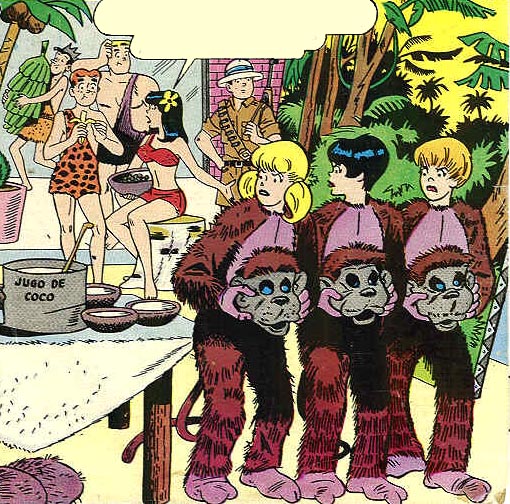
Have at it in comments.
Also, I’m looking for artists for a couple of projects – you know the email if you’re interested in working with me.
27
Apr
This is the song that never ends oh it goes on and on my friends
Posted by MGK Published in Comics, I Should Write Dr. Strange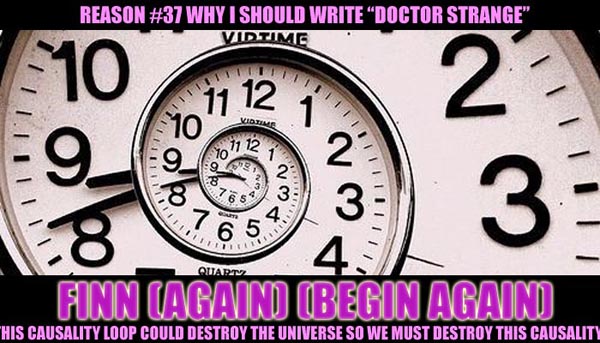
Time travel is part of the Sorcerer Supreme’s day job. It sounds interesting; it mostly isn’t. (I mean, from a certain point of view, time travel to the past is seeing stuff that already happened anyway and time travel to the future is like fast-forwarding through the good parts of the movie.) Two or three times a year, somebody invents time travel and they almost always travel to the past, which means Dr. Strange has to put on his time-travel pants, follow them back, do everything necessary to stop their stomping-on-butterflies (or whatever) from creating causality paradoxes, then remove the knowledge of time travel from their minds permanently. Really, it’s just kind of a slog.
(Every so often, somebody gets the bright idea of going back in time and murdering Strange’s parents before he was born, or Strange as a baby, or what have you. The same thing always happens: they commit their nefarious crime only to find out their targets are completely protected from their attack and don’t even notice the assault/explosion/whatever. Then they turn around, where Doc stands there, arms crossed, looking rather irritated.)
But this time around it’s different, because Colin Finn hasn’t invented time travel. He’s not even a theoretical physicist or mystic-in-training. He’s a deliveryman for a courier company. Drives one of those vans, wears a dorky uniform. Has a girlfriend who dumped him six months ago because his life was going nowhere. Plays XBox with his buddies, likes books with swords and knights in them. He’s an average dude.
Except that whenever he gets stressed or nervous he restarts the flow of time; rewinds the entire day instantly to when he got out of bed. He’s been doing it for a long time now; the universe has been stuck on July 7th over and over again. Sometimes he gets a few weeks out, sometimes a month or two, sometimes only a few days, but inevitably reality goes zzzzzzzwoooooop and he’s back in bed. He can’t control it, can’t stop it, and you’d better believe nobody notices it. He’s tried killing himself a couple of times and that just auto-rewinds everything for him. He’s really very depressed about the whole thing.
Well, except for Dr. Strange. Deja vu eventually becomes more than just deja vu, after all, when you’ve got the top job, and after a few thousand repetitions any Sorcerer Supreme worth his salt would start the day realizing he’d already started the day previously. After a few attempts to divine what’s going on fail (“By the million eyes of Ashtur, I beseech thee, reveal the-” zzzzzzzwoooooop “Oh, damn it!”) eventually Strange does what he probably should have done in the first place if he didn’t keep waking up the night after he’d only gotten three hours of not-very-satisfactory sleep: he goes outside the universe.
And that’s how he finds out that things are actually much worse than he thought. Because Finn isn’t just rewinding time. He’s using chronal energy, and that energy has to come from somewhere – and it’s coming from the past and the future. The past is steadily being eaten away as Finn rewinds, again and again and again, and the future will never be. And every time, the great rewind stores more and more chronal energy – Finn is literally becoming a timebomb, but in the far more literal sense as well as the one we’re all familiar with.
You can’t kill him – even if you could manage it, what would happen to that release of time? (Answer: a lot of things, most of it bad.) So Stephen Strange has to somehow cure the strange affliction which presents itself to him. But how do you do that? This isn’t a cute movie starring Bill Murray; it’s not about Finn, the rewind doesn’t care about him becoming a better person. This is something that was done to the guy. And Stephen has less and less time – literally – to figure out what.
26
Apr
My weekly TV column is up at Torontoist.
26
Apr
As requested, part two
Posted by MGK Published in Archie (Improved Or Otherwise), Bad Comedy, Comics, Here's A Lot Of Photoshops, Photoshopp'd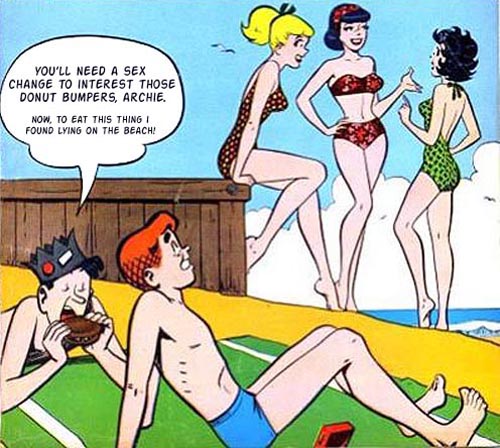
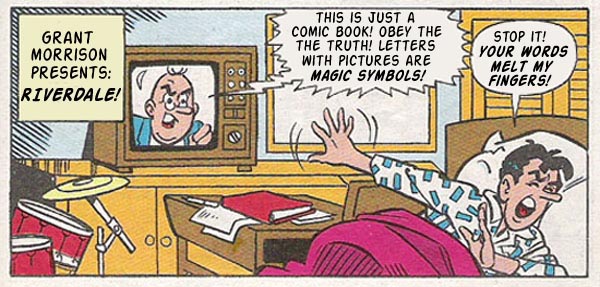
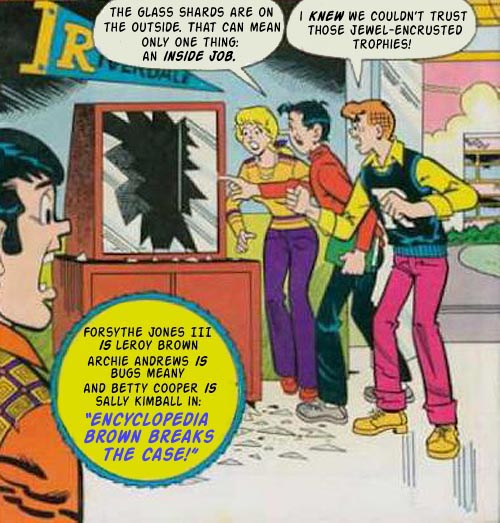
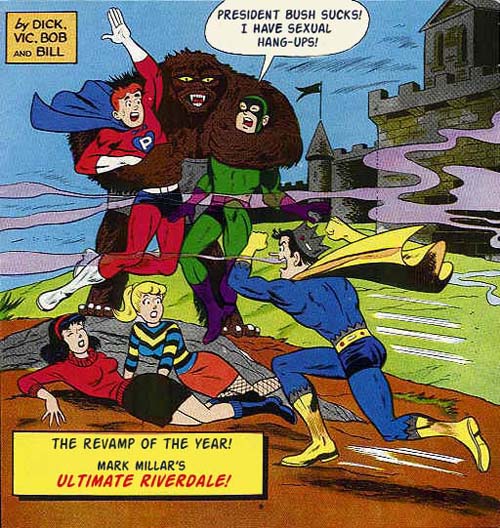
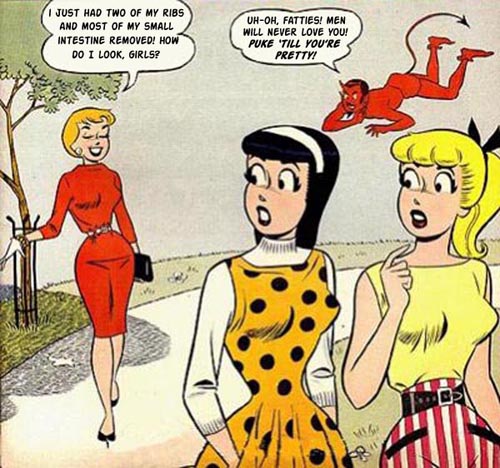
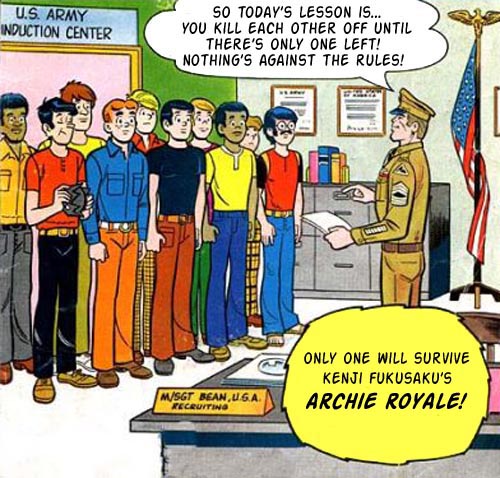
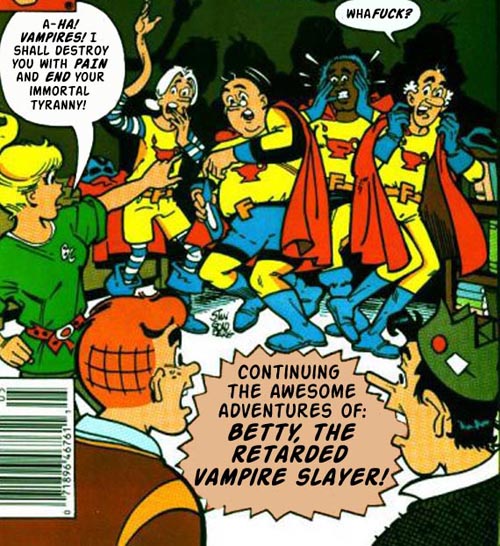
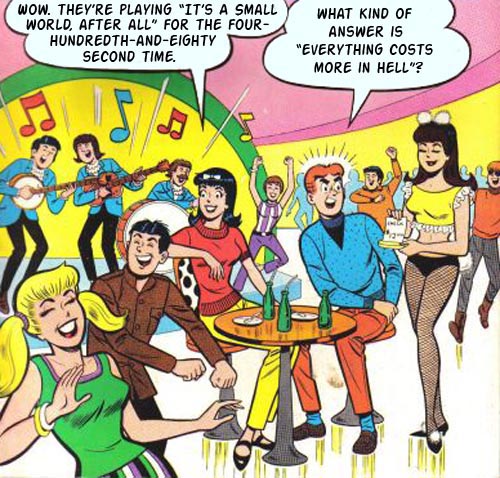
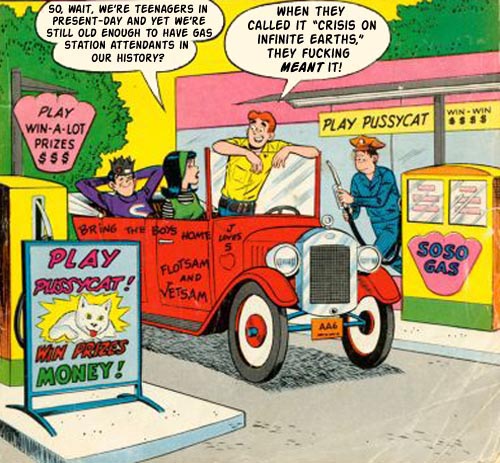
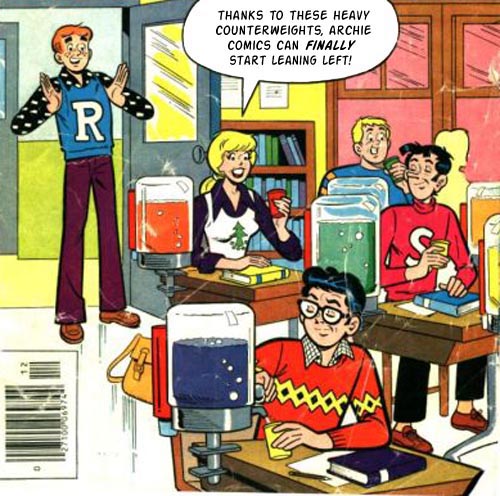
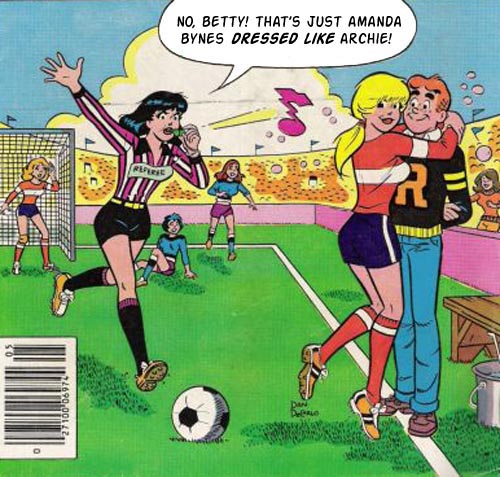
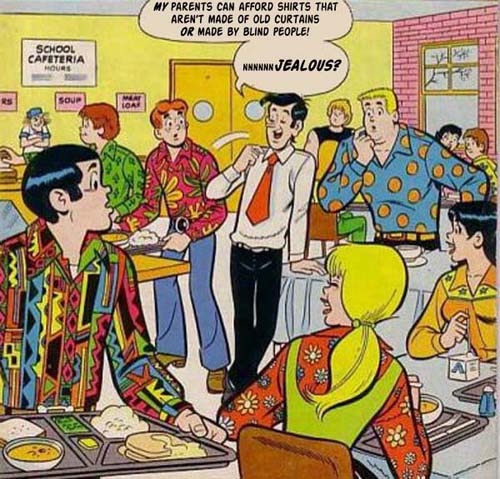
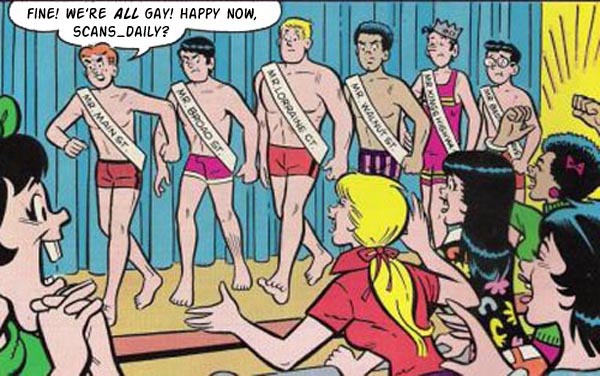
Search
"[O]ne of the funniest bloggers on the planet... I only wish he updated more."
-- Popcrunch.com
"By MightyGodKing, we mean sexiest blog in western civilization."
-- Jenn
Contact
MGKontributors
The Big Board
MGKlassics

Blogroll
- ‘Aqoul
- 4th Letter
- Andrew Wheeler
- Balloon Juice
- Basic Instructions
- Blog@Newsarama
- Cat and Girl
- Chris Butcher
- Colby File
- Comics Should Be Good!
- Creekside
- Dave’s Long Box
- Dead Things On Sticks
- Digby
- Enjoy Every Sandwich
- Ezra Klein
- Fafblog
- Galloping Beaver
- Garth Turner
- House To Astonish
- Howling Curmudgeons
- James Berardinelli
- John Seavey
- Journalista
- Kash Mansori
- Ken Levine
- Kevin Church
- Kevin Drum
- Kung Fu Monkey
- Lawyers, Guns and Money
- Leonard Pierce
- Letterboxd – Christopher Bird - Letterboxd – Christopher Bird
- Little Dee
- Mark Kleiman
- Marmaduke Explained
- My Blahg
- Nobody Scores!
- Norman Wilner
- Nunc Scio
- Obsidian Wings
- Occasional Superheroine
- Pajiba!
- Paul Wells
- Penny Arcade
- Perry Bible Fellowship
- Plastikgyrl
- POGGE
- Progressive Ruin
- sayitwithpie
- scans_daily
- Scary-Go-Round
- Scott Tribe
- Tangible.ca
- The Big Picture
- The Bloggess
- The Comics Reporter
- The Cunning Realist
- The ISB
- The Non-Adventures of Wonderella
- The Savage Critics
- The Superest
- The X-Axis
- Torontoist.com
- Very Good Taste
- We The Robots
- XKCD
- Yirmumah!
Donate
Archives
- August 2023
- May 2022
- January 2022
- May 2021
- January 2021
- December 2020
- October 2020
- June 2020
- March 2020
- January 2020
- December 2019
- October 2019
- February 2019
- January 2019
- December 2018
- April 2018
- March 2018
- February 2018
- January 2018
- December 2017
- November 2017
- October 2017
- February 2017
- January 2017
- December 2016
- November 2016
- October 2016
- September 2016
- August 2016
- July 2016
- June 2016
- May 2016
- April 2016
- March 2016
- February 2016
- January 2016
- December 2015
- November 2015
- October 2015
- September 2015
- August 2015
- July 2015
- June 2015
- May 2015
- April 2015
- March 2015
- February 2015
- January 2015
- December 2014
- November 2014
- October 2014
- September 2014
- August 2014
- July 2014
- June 2014
- May 2014
- April 2014
- March 2014
- February 2014
- January 2014
- December 2013
- November 2013
- October 2013
- September 2013
- August 2013
- July 2013
- June 2013
- May 2013
- April 2013
- March 2013
- February 2013
- January 2013
- December 2012
- November 2012
- October 2012
- September 2012
- August 2012
- July 2012
- June 2012
- May 2012
- April 2012
- March 2012
- February 2012
- January 2012
- December 2011
- November 2011
- October 2011
- September 2011
- August 2011
- July 2011
- June 2011
- May 2011
- April 2011
- March 2011
- February 2011
- January 2011
- December 2010
- November 2010
- October 2010
- September 2010
- August 2010
- July 2010
- June 2010
- May 2010
- April 2010
- March 2010
- February 2010
- January 2010
- December 2009
- November 2009
- October 2009
- September 2009
- August 2009
- July 2009
- June 2009
- May 2009
- April 2009
- March 2009
- February 2009
- January 2009
- December 2008
- November 2008
- October 2008
- September 2008
- August 2008
- July 2008
- June 2008
- May 2008
- April 2008
- March 2008
- February 2008
- January 2008
- December 2007
- November 2007
- October 2007
- September 2007
- August 2007
- July 2007
- February 2007
Tweet Machine
- No Tweets Available
Recent Posts
- Server maintenance for https
- CALL FOR VOTES: the 2021 rec.sport.pro-wrestling Awards
- CALL FOR NOMINATIONS: The 2021 rec.sport.pro-wrestling Awards (the Theszies)
- The 2020 RSPW Awards – RESULTS
- CALL FOR VOTES: the 2020 Theszies (rec.sport.pro-wrestling Awards)
- CALL FOR NOMINATIONS: The 2020 Theszies (rec.sport.pro-wrestling awards)
- given today’s news
- If you can Schumacher it there you can Schumacher it anywhere
- The 2019 RSPW Awards – RESULTS
- CALL FOR VOTES – The 2019 RSPW Awards (The Theszies)
Recent Comments
- George Leonard in When Pogo Met Simple J. Malarkey
- Blob in How Jason Todd Went Wrong A Second Time
- Cindi Chesser in Thursday WHO'S WHO: The War Wheel
- Scott Hater in Bing, Bang, Bing, Fuck Off
- dan loz in Hey, remember how we talked a while a back about b…
- Sean in Server maintenance for https
- Ethan in CALL FOR VOTES: the 2021 rec.sport.pro-wrestling A…
- wyrmsine in ALIGNMENT CHART! Search Engines
- Jeff in CALL FOR VOTES: the 2021 rec.sport.pro-wrestling A…
- Greg in CALL FOR VOTES: the 2021 rec.sport.pro-wrestling A…
